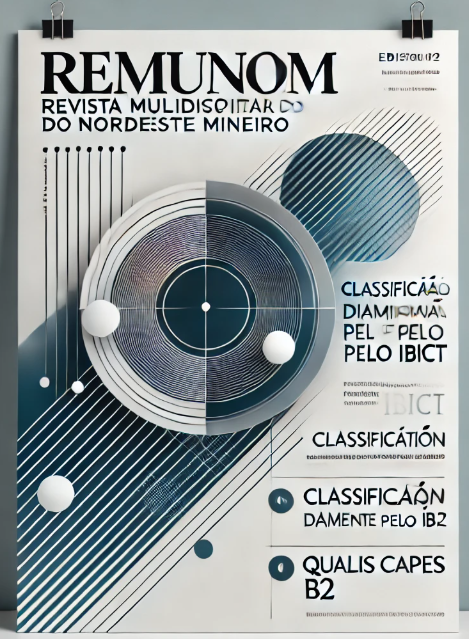EFEITO DO USO DE PROBIÓTICOS NA SINTOMATOLOGIA GASTROINTESTINAL DA DOENÇA CELÍACA: UMA REVISÃO NARRATIVA
DOI:
https://doi.org/10.61164/rmnm.v10i1.4083Keywords:
Celiac disease. Probiotics. Gluten. Gut microbiota. Gastrointestinal symptoms.Abstract
Celiac disease (CD) is an autoimmune enteropathy triggered by gluten ingestion, leading to chronic inflammation of the small intestine and gastrointestinal symptoms such as diarrhea, abdominal pain, and bloating. The only known effective treatment is strict adherence to a gluten-free diet. However, some patients continue to experience gastrointestinal symptoms even with dietary restriction. In this context, probiotics have been investigated as a complementary strategy for modulating the gut microbiota and alleviating persistent symptoms in individuals with CD. This narrative review aims to analyze the available scientific evidence regarding the relationship between probiotic use and gastrointestinal symptoms in celiac patients. A comprehensive search was conducted in scientific databases to identify studies that evaluated the impact of probiotics on symptom relief and intestinal health in this population. The literature suggests that probiotics may contribute to the balance of gut microbiota, strengthening of the intestinal barrier, and reduction of pro-inflammatory responses. Some studies reported improvements in symptoms such as bloating and changes in bowel habits. However, the results are inconsistent, with great variability in study design, probiotic strains used, treatment duration, and patient profiles. This heterogeneity limits the ability to draw definitive conclusions about efficacy. Thus, the analyzed data suggest that the use of probiotics may represent an effective complementary nutritional approach in the management of celiac disease, especially in patients who continue to experience symptoms despite a gluten-free diet. However, their use should be guided by qualified healthcare professionals, considering individual needs, with the goal of modulating inflammatory responses, restoring microbiota balance, and improving quality of life.
Keywords: Celiac disease. Probiotics. Gluten. Gut microbiota. Gastrointestinal symptoms
References
FASANO, A. et al. Celiac disease and non-celiac wheat sensitivity: State of art of non-dietary therapies. Frontiers in Nutrition, Lausanne, v. 7, p. 152, 2020. Disponível em: https://www.frontiersin.org/articles/10.3389/fnut.2020.00152/full.
PETERS, S. L. et al. Epidemiology of Celiac Disease: A Population-Based Study. Journal of Pediatric Gastroenterology and Nutrition, Philadelphia, v. 74, n. 3, p. 325–330, 2022.
VOROBJOVA, T. et al. Symptom persistence in celiac disease despite a gluten-free diet: causes and diagnostic approach. World Journal of Gastroenterology, Pleasanton, v. 29, n. 6, p. 943–957, 2023.
VALITUTTI, F.; CUCCHIARA, S.; FASANO, A. Celiac Disease and the Microbiome. Nutrients, Basel, v. 11, n. 10, p. 2403, 2019. Disponível em: https://www.mdpi.com/2072-6643/11/10/2403.
HILL, C. et al. Expert consensus document: The International Scientific Association for Probiotics and Prebiotics consensus statement on the scope and appropriate use of the term probiotic. Nature Reviews Gastroenterology & Hepatology, London, v. 11, p. 506–514, 2014.
KLEI-JUNIOR, C. M. et al. O papel dos probióticos na saúde intestinal: uma revisão integrativa da literatura. Revista de Nutrição e Saúde, São Paulo, v. 10, n. 1, p. 42–50, 2022.
PRITZL, C. J. et al. Bifidobacterium supplementation improves gluten digestion and reduces inflammation in celiac disease models. Frontiers in Immunology, Lausanne, v. 11, p. 575986, 2020.
MARTINELLO, R. O.; ROMAN, F. R.; SOUZA, C. C. Doença celíaca: aspectos clínicos, diagnóstico e condutas nutricionais. Revista Brasileira de Nutrição Clínica, São Paulo, v. 32, n. 1, p. 34–41, 2017.
NIKOLOUDAKI, E. et al. Current updates on celiac disease: From pathogenesis to therapy. International Journal of Molecular Sciences, Basel, v. 25, n. 1, p. 149, 2024.
SEILER, C. L. et al. Probiotics for celiac disease: A systematic review and meta-analysis of randomized controlled trials. Clinical Nutrition, Edinburgh, v. 39, n. 5, p. 1483–1494, 2020.
FRANCAVILLA, R. et al. Clinical and microbiological effect of a multispecies probiotic supplementation in celiac patients with persistent IBS-type symptoms: A randomized, double-blind, placebo-controlled, multicenter trial. Journal of Clinical Gastroenterology, Philadelphia, v. 53, n. 3, p. e117–e125, 2019. Disponível em: https://www.ncbi.nlm.nih.gov/pmc/articles/PMC6382041/.
MASCARENHAS, A. R. et al. Probióticos no manejo da doença celíaca: uma revisão de literatura. Revista de Nutrição Clínica e Experimental, São Paulo, v. 8, n. 1, p. 11–19, 2023.
ALI, N. et al. Probiotics for the management of celiac disease in children: A randomized clinical trial. Clinical Nutrition ESPEN, Edinburgh, v. 49, p. 433–438, 2022.
JEDWAB, A. et al. The effect of probiotics on the gut microbiota in children with celiac disease: A systematic review. Nutrients, Basel, v. 14, n. 3, p. 540, 2022.
COSTA AZEVEDO, A. A. Probióticos e doença celíaca: evidências científicas e perspectivas terapêuticas. Revista de Gastroenterologia Funcional, São Paulo, v. 19, n. 2, p. 77–84, 2023.
Downloads
Published
How to Cite
Issue
Section
License
Copyright (c) 2025 Revista Multidisciplinar do Nordeste Mineiro

This work is licensed under a Creative Commons Attribution-NonCommercial-ShareAlike 4.0 International License.




